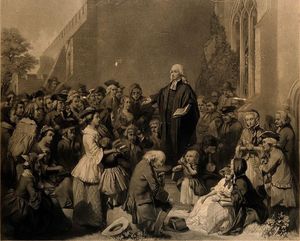‘Not preachy!’ The words stuck in my head. A gentleman marketing a religious feature in a public newspaper was commending a certain style of writing.
In his view, anything that sounded remotely like preaching was to be avoided. I knew what he meant. To write or speak in a ‘preachy’ way is to be direct, forceful, certain and confident. Preaching is often confrontational, absolutist, and upsetting to people, and that is no longer acceptable to many.
Communicating
To communicate in our day (it is generally believed) means to take a soft tone and avoid sounding dogmatic. One must not condemn. One must be tolerant. One must not speak of right and wrong. One must not draw fine distinctions which make people think.
I am sure that preaching can sometimes be unnecessarily offensive. The Elmer Gantrys of this world are always with us. Television religion has so degraded preaching that it has become a byword, a source of humour on late night talk shows. We have all heard men rant and rave in the pulpit, with a great deal of heat but no light.
Little wonder, then, that preaching has a bad reputation today. When I was doing my graduate work in a main-line seminary, there was actually talk, in private circles, of the total demise of preaching. Art, drama, dialogue, small groups – these are gradually taking the place of preaching.

Mission from heaven
And yet, when we turn to the Word of God, we find that preaching is God’s chosen method of getting out his message. The apostle Paul said that it pleased God through the ‘foolishness of the message preached’ to save those who believe (1 Corinthians 1:21).
‘The message preached’: there is plenty of room for ‘art’, ‘dialogue’, and even ‘drama’ in good preaching. But still it is the voice of one called of God that is blessed. One sent on a mission from heaven, burning with love to men and inspired with deep conviction.
How dare we say that preaching should be abandoned? John the Baptist, who introduced Jesus to the world, came ‘preaching’ (Matthew 3:1). Jesus went about his native country teaching and ‘preaching the gospel of the Kingdom’ (Matthew 4:23).
Has God changed his programme? No. The needs of men are still the same. The gospel is just as glorious as it ever was. What we need is not the abandonment of preaching, but the repudiation of bad preaching.
Pulpit power
Every great revival in history has featured great preaching. Spurgeon once said that he was suspicious of any so-called spiritual awakening that did not feature pulpit power.

Where would the Christian church be, humanly speaking, without Savonarola inveighing against the moral laxities of Florence? Without Luther’s thunderous preaching that shook Germany and caused the Vatican to tremble? Without the preaching of Whitefield and Edwards, that stirred the American colonies and produced such a mighty religious revival that we are still drawing interest on it today?
I realise there is something absurd about a ‘talking head with a Bible’ in this day of sound bites, seeker-sensitive play acting in church, dazzling TV images and other visual delights.
Blessed of God
The sight of a man of God preaching Christ, crying out against the tide of popular culture, and hewing the lines of biblical theology, seems archaic to many. And yet, wonder of wonders, God uses it!
People who love the Lord still come to listen as his servants expound the life-giving message of Jesus Christ. After all, it is not the preacher that has the power, for that resides in the Word. Faithful, Spirit-filled preaching is still blessed of God.
The foolishness of God is still wiser than men and the weakness of God is still stronger than men. The call of God today is still the same as it was in Bible times. It reverberates down the corridors of time and through the halls of history: ‘Preach the Word!’ (2 Timothy 4:2).







